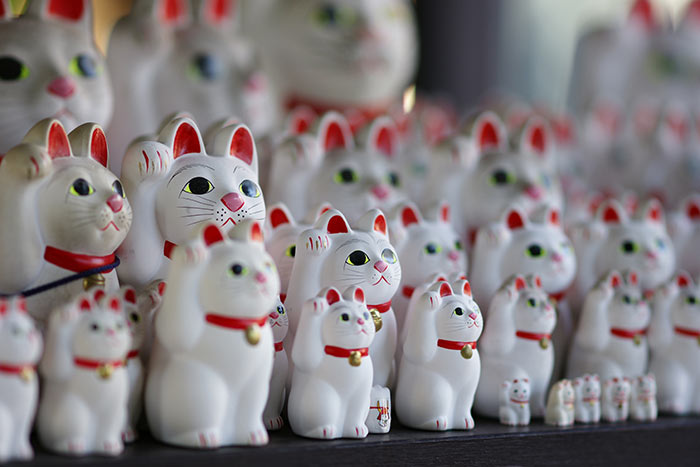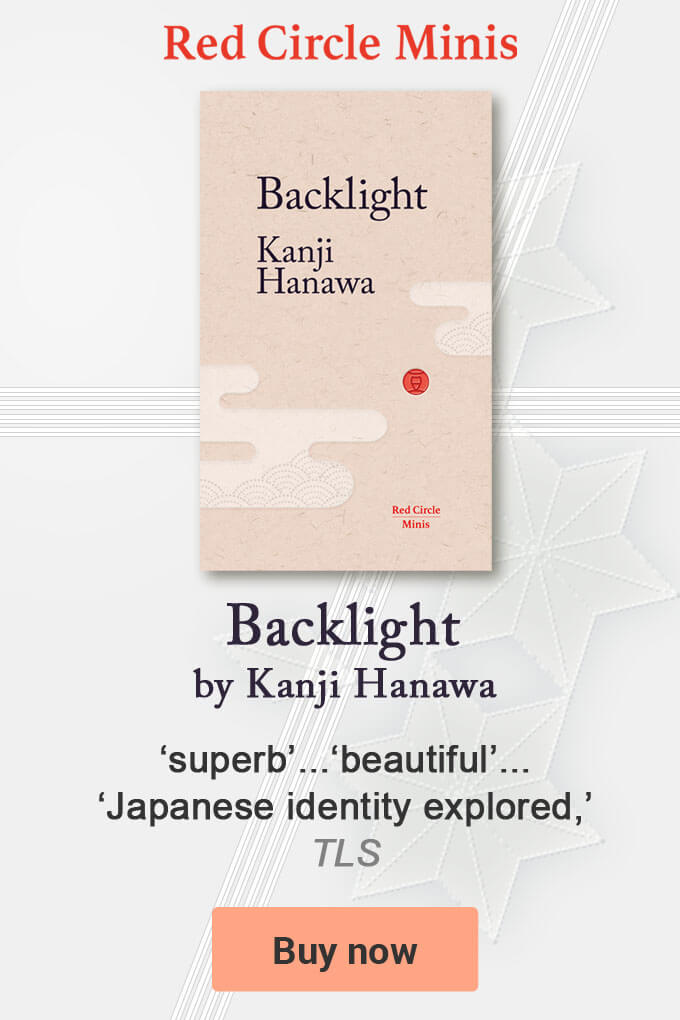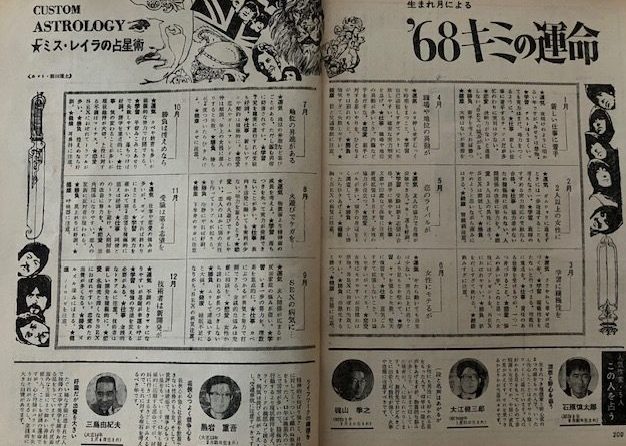 Double page spread in the spring 1968 edition of Playboy Custom featuring astrological readings for five Japanese authors. Photo: Red Circle Authors
Double page spread in the spring 1968 edition of Playboy Custom featuring astrological readings for five Japanese authors. Photo: Red Circle AuthorsIn 1968 two years before Yukio Mishima (1925-1970) killed himself astrological predictions about the fate of five popular Japanese writers, Shintaro Ishihara (1932-2022), Kenzaburo Oe (1935-2023), Toshiyuki Kajiyama (1930-1975), Jugo Kuroiwa (1924-2003) and Mishima were published in the spring edition of Playboy Custom. Miss Leila’s astrology, published under the headline Custom Astrology, predicts a year of good performance but at a high cost for Mishima.
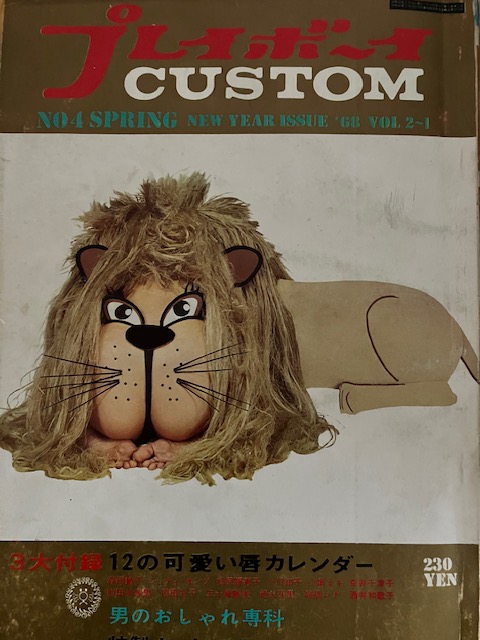 Cover of 1968 spring edition of Playboy Custom. Photo: Red Circle Authors
Cover of 1968 spring edition of Playboy Custom. Photo: Red Circle AuthorsIn 1968 Mishima published Inochi urimasu (Life for Sale) and the play Waga tomo Hittora (My Friend Hitler) but how good were the predications and did they provide any clues to the trajectories these authors would follow in future years?
This was the year that Ishihara, a winner of the Akutagawa Prize, ran for elected office as a member of the Liberal Democratic Party (LDP) kicking off his career as a politician changing his career path.
He went on to become Governor of Tokyo and set up a political party. Outside Japan Ishikawa is known for the book he co-wrote with one of the founders of Sony, Akio Morita (1921-1999), The Japan That Can Say No.
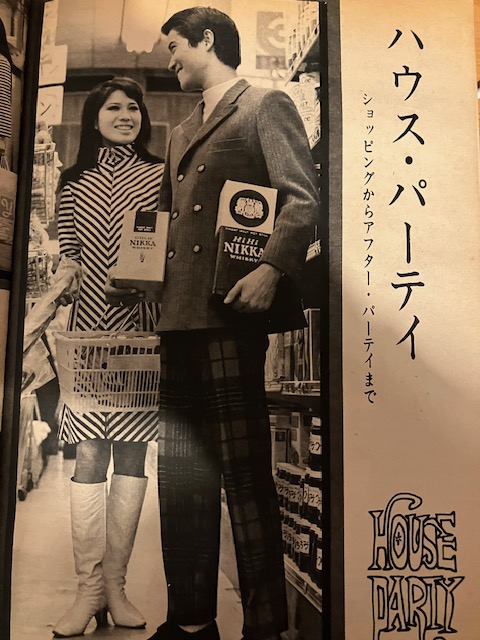 House party feature in 1968 spring edition of Playboy Custom. Photo: Red Circle Authors
House party feature in 1968 spring edition of Playboy Custom. Photo: Red Circle AuthorsHis Playboy Custom astrological reading describes Ishihara as “an idealist” who once his mind is made up “always follows through” and an individual with good election prospects.
Oe is predicted to become increasingly famous, he went on to win the Nobel Prize in Literature in 1994 but his stars ominously indicate that “material worries will increase and hidden secrets will become known to others”.
Kajiyama, whose 1962 novel Kuro no testu kaa (The Black Test Model) was a huge genre-making hit, is warned by Miss Leila’s reading of his horoscope about a long-term illness and traffic accidents. Kajiyama died suddenly in 1975 from cirrhosis of the liver in a hotel in Hong Kong during a research trip.
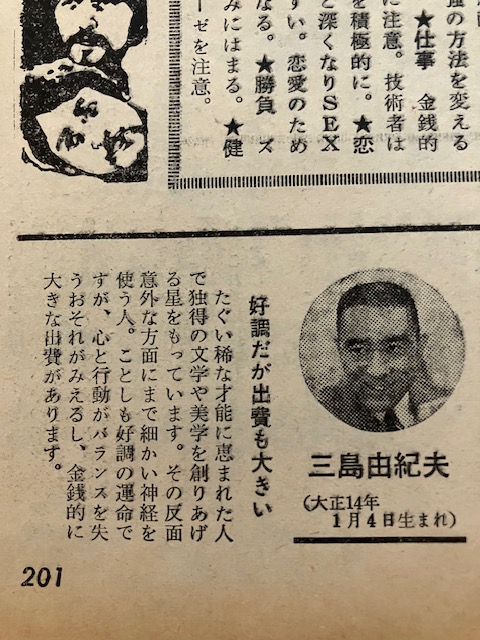 Yukio Mishima’s (1925-1970) horoscope for 1968 published in the spring edition of Playboy Custom. Photo: Red Circle Authors
Yukio Mishima’s (1925-1970) horoscope for 1968 published in the spring edition of Playboy Custom. Photo: Red Circle AuthorsOn the other hand, the prediction for Koroiwa, whose novel Haitoku no mesu (Immoral Surgery) about an unscrupulous doctor won the Naoki Prize for commercial fiction in 1961, describes him as a personality “sensitive to the world unable to ignore its problems” and despite forecasting that there are signs he may run into problems with “material” Koroiwa in fact branched out in the decades to come from crime fiction and mysteries into historical fiction, a genre he later won critical acclaim for and the Kikuchi Kan Prize in 1992.
And as for Mishima’s this is what his 1968 stars foretold:
“A person whose stars are that of an individual blessed with a rare talent with the ability to generate unique literature and aesthetics. Conversely, someone minutely sensitive, even in unexpected domains. Destined to be another good year but one with risk from a mind and action out of balance. In terms of the financial there will be major outgoings”.
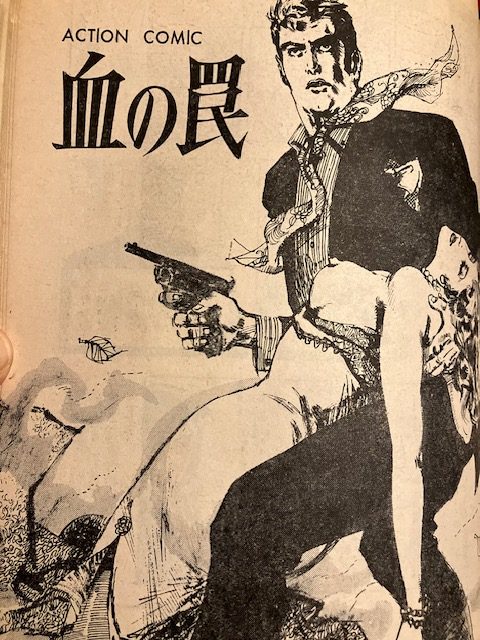 Title page of comic book feature by Haruhiko Oyabu (1935-1996) in the spring 1968 edition of Playboy Custom. Photo: Red Circle Authors
Title page of comic book feature by Haruhiko Oyabu (1935-1996) in the spring 1968 edition of Playboy Custom. Photo: Red Circle AuthorsIn addition to the two-page astrological spread with its predictions for these five authors stretching horizontally across the bottom of the pages, the magazine published nudes (mostly blonds), articles on cars (including Bertone’s Lamborghini Marzal), mahjong, science fiction, fashion, driving on snow, fishing and bars as well as an action comic strip titled Chi no wana (Blood Trap) by Haruhiko Oyabu (1935-1996) and book reviews.
This issue of the magazine also contains a host of musical pullouts linked to a feature on the one-week guitar. The pullouts contain the music and lyrics of songs such as Quincy Jones’ In the Heat of the Night, My Girl by William Robinson and Ronald White, When the Saints Go Marching In and I want to Hold Your Hand by J. Lennon and P. McCartney and basic information on how to play a guitar.
Predictive or not, a fascinating glimpse through the lens of Japanese magazine publishing into some Japanese fashions, trends, aesthetic choices, and whisky-related and audio equipment display advertising of old and perhaps even Mishima’s perceived mental health and steadiness. In the year that Yasunari Kawabata (1899-1972), his friend, became the first Japanese author to win the Nobel Prize in Literature, a prize Mishima coveted.
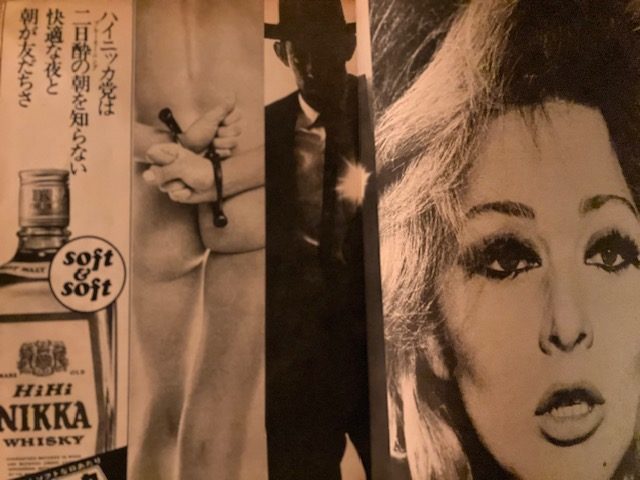 Whisky advert in the spring 1968 edition of Playboy Custom. Photo: Red Circle Authors
Whisky advert in the spring 1968 edition of Playboy Custom. Photo: Red Circle Authors
